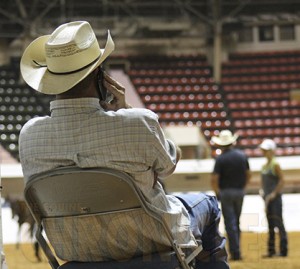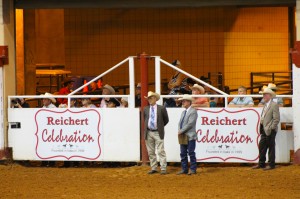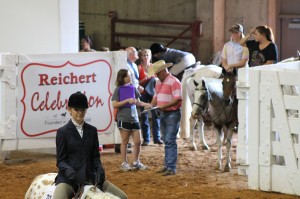BIG Changes in Store For 2014 Reichert Celebration Sale- EC Exclusive With JR Reichert
By: Brittany Bevis
Some might argue that despite various outlets for discussion, like conventions and workshops, it’s hard to feel like you have the power to enact any real change in the way things are run within a breed association, or a horse show for that matter. JR Reichert is turning that notion on its head by announcing some BIG changes to the Reichert Celebration Sale that will be implemented at the 2014 show and sale in Fort Worth, Texas. And it all came about thanks to a question posed on Facebook…
Imagine this scenario: You’re sitting ringside at a huge horse sale anxiously awaiting the moment when that special horse will step up to the auction block. You’ve spent all day pouring over the catalog to select the perfect prospect when suddenly the price jumps up to an exorbitant amount thanks to a “mysterious bidder” or the horse never even enters the sale pen. Frustrating? Yes. Uncommon? No.
According to JR Reichert, the practice of simply running a horse through a sale in order to make it eligible to compete in high stakes sale classes the following year is a common practice. However, it’s one he hopes to prevent with some new changes to his sale program.
“We’ve had ourselves quite a few good years, and I keep trying to change with the times,” Reichert says. “In the past, this type of situation has created big pots all over the country with all of the yearling sales. That was fine to build the pots, but what it has created is a monster. A lot of the horses go in a sale just to be eligible for the sale classes (50% or better) and that creates a false market and also creates frustration for the consumers who are trying to buy yearlings. They don’t know which horses are there to be sold and which are just being run through to be eligible.”
“Last year, we had a video sale, and that did help the situation. I want to take another step forward by making this a real sale. I ran a sale barn for 16 years, so I knew what I thought, but I wanted to ask the public. I put it out there on Facebook, and I got an overwhelming response.”
For most, the solution was clear and simple. Only horses that are truly for sale should have the opportunity to participate in the sale. However, many recognized that it’s not always that cut and dry in the horse industry.
First of all, how would show and sale management regulate such a thing? Also, what about the good-intentioned folks, who put a horse in the sale, intending to sell it, but the horse just didn’t meet their reserve amount and they elected to No Sale? Reichert addresses all of these questions but acknowledges it won’t be a simple fix.
“The very first year, the horses had to be sold through the sale to be eligible for stakes classes the next year,” he says. “That worked fine until some didn’t sell. Then, all people did was transfer the horse into someone else’s name to [give the impression of selling] and got around that. The pot really grew, because it’s easier to have a sale make the pot grow when you’ve got horses running through being made eligible.”
“I’ve talked to some breeders, and they like this idea because they truly want to market their horses. Is it a 100% clear cut case? No. There are holes in any program, but we’re trying to plug those holes.”
“I think making a stand will help the sale, because people will truly know that horses in the sale are for sale. This will also help the true breeder who’s trying to raise his colts and market them. I look at the broodmare and breeding business the same way as I do farming. You need a nice quality broodmare to breed to a nice stallion, and that takes money. Then, you have to nurture that mare and colt. Then, you get the weanling ready for the sale market, so you can pay for the current year and do it all over next year. I compare it to how farmers raise their crops.”
Still, Reichert recognizes that, at the heart of any horse sale, there is a negotiation that must take place between the seller and buyer. Sometimes, it’s difficult to make a deal before the auctioneer’s gavel falls. If that happens, and the horse is a No Sale, buyers and sellers can renegotiate outside of the ring.
“That seller knows what he has to do to break even and make a profit on his product,” he says. “Part of the negotiation is if they don’t get enough to sell, the seller can go back after and negotiate the sale price, just like if you were at a private farm. After the sale, we will have a list of No Sale horses that people can look at. They will be eligible for the next year’s sale classes even if they are a No Sale here.”
Ultimately, Reichert’s goal is to help sellers find buyers for their horses. Period. He intends to do that by enhancing a program that encourages people to buy. Reichert emphasizes that unlike other horse show/sale events, competitors participating in the Reichert Celebration Sale Stakes Program will only be competing against other horses that have also gone through the sale.
“We’ve given over $2 million, since 1999, to horses that have sold through the sale,” he says. “Every year, every one of the 2-year-olds that are shown, that have been through our sale at the Reichert Celebration, has walked away with a check. That’s unheard of. If there are two in a class, two will get a check. If there are 25 in a class, 25 will get a check.”
This year, 14 different sale stakes classes are split up into divisions that separate the $50,000 and over earning horse trainer from the $50,000 and under earning horse trainer.
“We will have classes all the way from the top professionals to very beginners, and we will pay down as far as we’ve got riders,” he says. “There is a huge amount of great horses that don’t ever make it out of their splits at a major horse show. Those people need to have a place to play. That’s the whole concept for the $50,000 and under trainer division, because the top pays for itself. We want to make it to where anyone can come and be comfortable. It will pay $30,000 to the first place open trainer that bought one through the sale and $10,000 to the winner of $50,000 and under class.”
Three additional classes that have been added to the 2014 Stakes class lineup are 2-Year-Old Intermediate Western Pleasure, 3-Year-Old Open Western Pleasure, and 3-Year-Old Non-Pro Western Pleasure. Therefore, if a prospect doesn’t make it as a 2-year-old pleasure horse, there’s still an opportunity to compete for big bucks the following year.
In addition to requiring that all horses be onsite in order to participate in the sale, the event will be live webcast to give bidders at home the chance to purchase their favorite prospects.
Finally, on a more personal note, Reichert has decided to offer interest-free financing to any buyer interested in purchasing one of his own horses entered in the sale.
“If a person can’t afford to pay for a horse, in total, they can offer a down payment, make a monthly payment, and still own their horse,” he says. “This will be for my personal yearlings in the sale that have the Reichert name attached to them.”
Stay tuned to EquineChronicle.com for more updates about the 2014 Reichert Celebration. For more information visit ReichertCelebration.com














